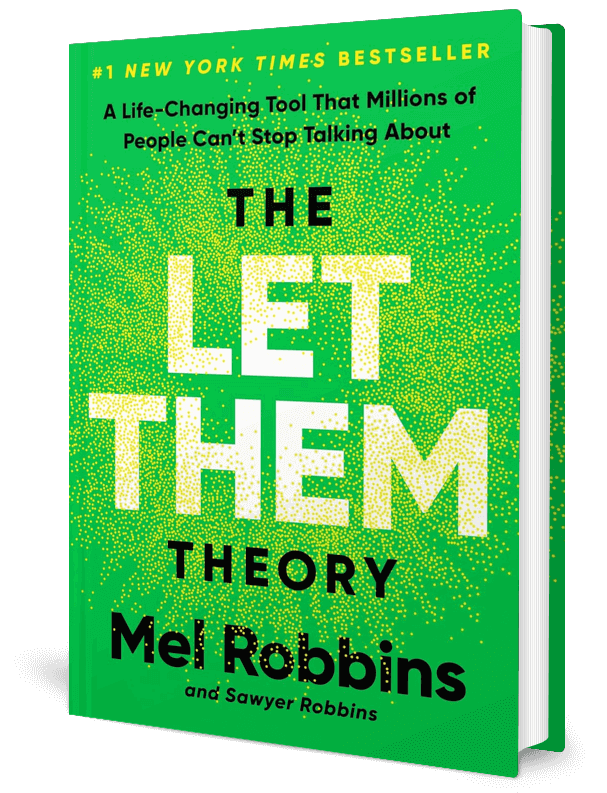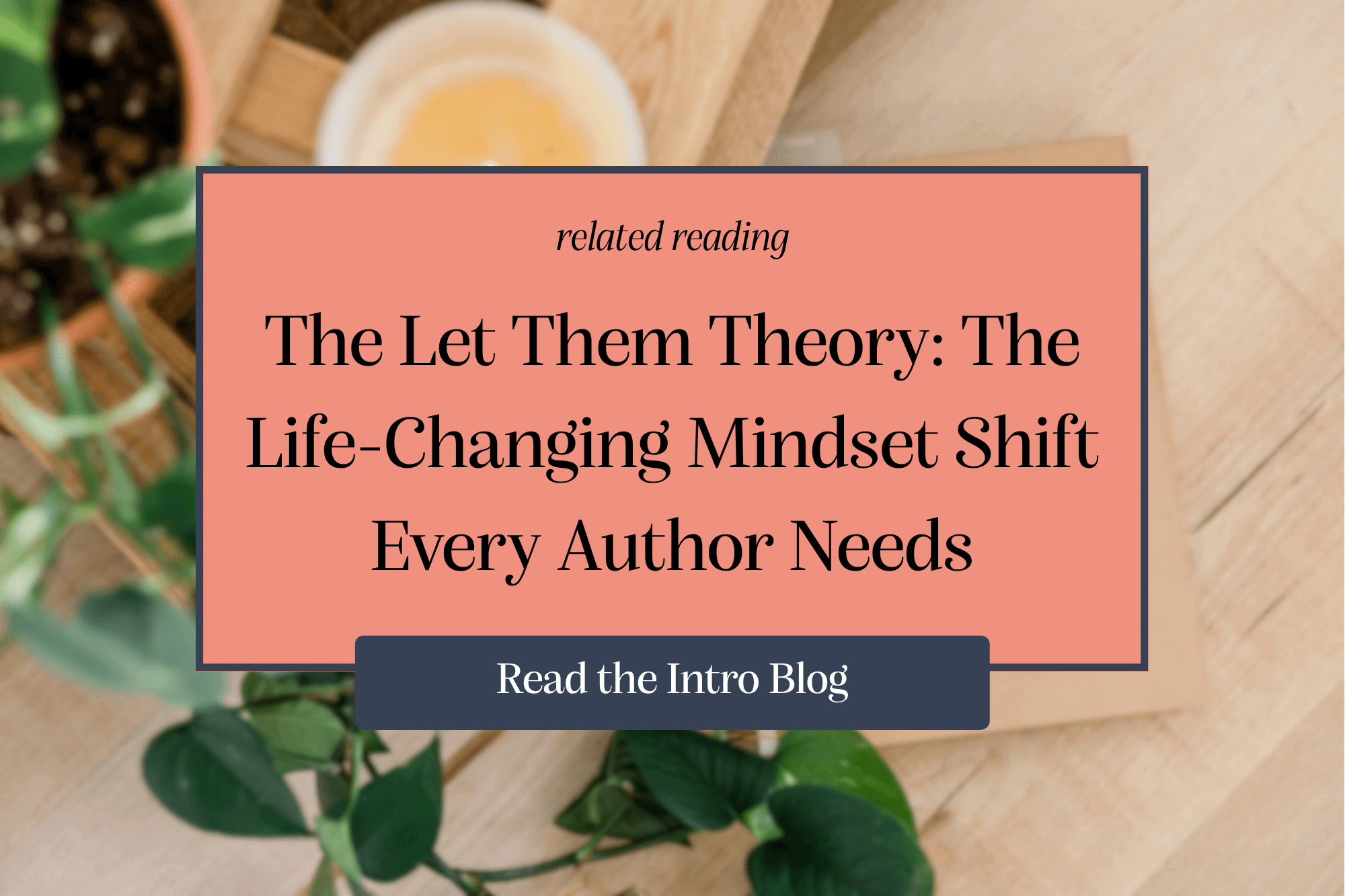Let Them Judge Your Self-Publishing Choice
Picture this:
You're at a family barbecue, feeling proud because you just hit "publish" on your debut novel last week.
Your aunt approaches with genuine curiosity and asks about your book. Your heart swells as you start to explain your story, the characters you've grown to love, the themes you've woven throughout. Then she asks where people can buy it.
"Oh," she says, her expression shifting slightly. "So you self-published? You couldn't get a real publisher?"
Your stomach drops. In one casual question, she's managed to diminish months or years of hard work, creative passion, and entrepreneurial courage.
You feel the familiar urge to explain, to justify, to educate her about the legitimacy of independent publishing.
You want to list all the successful indie authors, rattle off statistics about the growth of self-publishing, maybe even mention the higher royalty rates.
But what if, instead of spending your emotional energy trying to control her reaction, you simply thought: "Let her believe whatever she wants to believe about publishing"?
This is where the Let Them Theory transforms one of the most common challenges indie authors face: the constant need to justify their publishing choice to people who simply don't understand the industry.
The Self-Publishing Stigma That Won't Die
Despite the massive success of indie authors like Hugh Howey, Colleen Hoover, and Lauren Roberts—authors who either started indie or returned to indie publishing after traditional success—a stigma persists.
For many people, especially those outside the publishing industry, there's still a clear hierarchy in their minds: traditional publishing equals legitimacy, while self-publishing equals failure to make it in the "real" publishing world.
This stigma shows up in countless ways. Family members who introduce you as "trying to become a writer" even after you've published multiple books. Friends who assume you self-published because you "couldn't get an agent." Acquaintances who ask when you're going to get your book "properly published."
Each comment carries the implicit message that your choice to self-publish represents a consolation prize rather than a strategic business decision.
The most insidious part of this judgment is how it seeps into your own confidence.
You might find yourself over-explaining your publishing choice, rattling off indie success stories to validate your decision, or even apologizing for not going the traditional route.
You're essentially letting other people's limited understanding of the publishing industry dictate how you feel about your own career choices.
The traditional publishing gatekeeping mentality runs deep in our culture. For decades, the only path to readers was through agents, editors, and publishing houses.
This system created a powerful mythology: if the gatekeepers chose you, your work had value; if they didn't, it wasn't good enough.
This mythology persists even as the publishing landscape has completely transformed.
What's exhausting for indie authors is the constant educational burden. Every conversation about your book becomes a mini-seminar on the current state of publishing. You explain how self-published books can win awards, how they can become bestsellers, how traditional publishers now scout successful indie titles.
You find yourself becoming a spokesperson for an entire industry segment when all you wanted to do was write and publish your stories.
The judgment affects more than just casual conversations. It can influence your marketing confidence, your willingness to pitch speaking opportunities, and even your ability to price your work appropriately.
When you're constantly defending your publishing choice, it's hard to present yourself with the authority and confidence that successful businesses require.
Let Them Cling to Outdated Publishing Models
Here's where the Let Them Theory becomes your secret weapon against publishing snobbery:
You give yourself permission to stop trying to control other people's opinions about your business decisions.
Let them believe that traditional publishing is the only legitimate path to becoming a "real" author.
Let them cling to a mythology that was already outdated when they formed their opinions.
Let them not understand that the publishing industry has fundamentally changed in the last decade, creating opportunities that didn't exist when they learned what they think they know about publishing.
Let them assume you "couldn't make it" in traditional publishing.
Let them not realize that many successful indie authors actively chose this path over traditional offers, valuing creative control and higher royalties over the prestige of a traditional publisher's logo on their spine.
Let them miss the fact that some of today's bestselling authors started as indie success stories.
Let them not understand the business benefits of independent publishing—the faster time to market, the ability to build direct relationships with readers, the freedom to write what you want without committee approval.
Let them remain ignorant of the entrepreneurial skills you've developed in cover design, marketing, distribution, and business management.
Let them miss the revolution happening right in front of them, where authors are building sustainable businesses without needing permission from industry gatekeepers.
Most importantly, let them hold onto their judgments without feeling obligated to change their minds.
Their opinions about your publishing choice have absolutely no impact on your book sales, your reader relationships, or your creative fulfillment.
The energy you spend trying to educate them could be better used writing your next book or connecting with readers who actually appreciate your work.
Let Me Choose Entrepreneurship Over Gatekeeping
While you're letting other people maintain their outdated assumptions, you get to embrace the flip side of the Let Them Theory:
Giving yourself permission to make choices aligned with your goals rather than their expectations.
Let me choose creative control over external validation. When I self-publish, I decide on my cover design, my book description, my pricing strategy, and my marketing approach. I don't need to convince a publisher's marketing team that my vision is worth supporting—I get to bring my vision directly to readers and let them decide.
Let me build direct relationships with my audience. Instead of having a traditional publisher act as a middleman between me and my readers, I can engage directly through social media, email newsletters, and reader events. I know exactly who my readers are, what they love about my work, and what they're hoping to see next. This connection is invaluable for building a sustainable creative career.
Let me keep higher royalty percentages and maintain ownership of my intellectual property. Traditional publishing typically offers 6-25% royalties after you earn back your advance, while indie publishing can offer 35-70% royalties from the first sale. More importantly, I retain the rights to my work, which means I can make strategic decisions about foreign translations, audiobook productions, and adaptation opportunities without needing approval from a publisher.
Let me define success by my own business metrics. Maybe success means earning enough to quit my day job, or maybe it means reaching a specific number of readers who connect deeply with my work. Perhaps it's about creative freedom, flexible scheduling, or building a legacy I can pass on to my children. When I choose indie publishing, I get to define these metrics myself rather than having them imposed by someone else's business model.
The indie authors who've thrived while ignoring the skeptics, prove this approach works.
Hugh Howey has turned down traditional publishing deals with seven-figure advance offers because he wanted to maintain control over his work.
Colleen Hoover built a massive following through self-publishing before traditional publishers came calling.
Lauren Roberts self-published, grew a massive following, and use that power to leverage a deal with a publishing house for her “Powerless” series.
These authors succeeded not despite choosing indie publishing, but because they embraced it strategically and confidently.
When you stop needing approval for your publishing choice, you can focus on what actually matters: writing great books and getting them into the hands of readers who will love them.
You can invest your energy in building your business rather than defending it to people who weren't going to buy your books anyway.
Practical Scripts for Handling Publishing Judgment
Knowing the theory is one thing; applying it in real-world conversations is another.
Here are some practical approaches for handling common publishing-related judgments without getting pulled into exhausting educational debates.
When someone asks if you "couldn't get a real publisher."
Try: "I chose to publish independently because it aligns better with my business goals."
Then change the subject.
You don't owe anyone a detailed explanation of your strategic decision-making process, especially when they've already revealed their bias by calling traditional publishing "real" publishing.
If someone suggests you should "try to get properly published."
Here, you might respond: "I'm happy with my current publishing approach. Have you read any good books lately?"
This redirects the conversation away from your business choices and toward the actual purpose of books: being read and enjoyed.
When faced with the assumption that indie publishing is somehow easier or less legitimate.
Consider: "Every publishing path has its challenges and rewards. I've found the one that works best for my goals."
This acknowledges their perspective without agreeing with it or feeling compelled to change their mind.
The key is to respond with confidence rather than defensiveness.
You're not arguing your case—you're simply stating your position and moving on.
Remember, you're not trying to convert anyone to your way of thinking; you're just maintaining your own confidence in your choices.
Building a support network of fellow indie authors can provide the understanding and encouragement that well-meaning but uninformed family and friends might not be able to offer.
When you're surrounded by people who understand the strategic nature of your publishing choice, the outside judgments lose much of their sting.
Finally, reframe self-publishing as entrepreneurship, because that's exactly what it is.
You're not just a creative person hoping someone will give you permission to share your work—you're a business owner who has identified a market need and developed a product to meet it.
That's worth celebrating, regardless of what anyone else thinks about your chosen business model!
Your Publishing Choice Doesn't Need Their Approval
The most liberating realization for indie authors is this: Other people's opinions about your publishing path have zero impact on your actual success.
The readers who love your books don't care how those books reached them—they care about the story, the characters, the experience you've created.
The business success you build doesn't depend on industry gatekeepers' approval—it depends on your ability to consistently deliver value to your audience.
When you stop expending energy trying to justify your publishing choice to people who don't understand the industry, you free up that energy for activities that actually move your career forward.
You can focus on improving your craft, building your audience, and creating the sustainable creative business you actually want.
The publishing industry will continue to evolve, and the lines between traditional and indie publishing will continue to blur.
Hybrid approaches are becoming more common, traditional publishers are adopting indie strategies, and readers are becoming increasingly indifferent to how their favorite books reach them.
The people clinging to outdated publishing hierarchies will eventually have to confront reality—but that's not your job to facilitate.
Your job is to write great books, get them to readers who will appreciate them, and build the creative career that aligns with your values and goals.
Let them think whatever they want to think about how you've chosen to do that. Their approval was never required for your success.
Next time, we'll explore another common publishing pressure: "Let Them Question Your Hybrid Approach"—because even when you strategically use multiple publishing paths, someone will always have an opinion about your choices.
This post is part of the Let Them Theory for Authors series. Explore the complete series for more insights on building creative confidence and professional boundaries.













